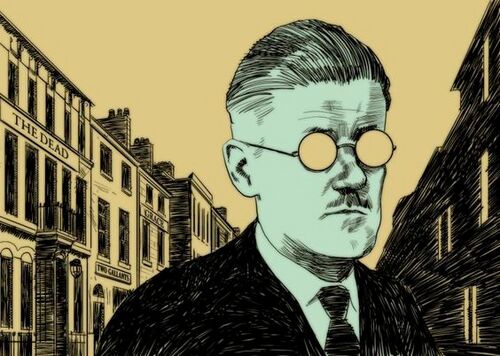When I first read James Joyce’s “Araby,” I was struck by how deeply I related to the narrator’s experience of youthful infatuation and the painful collision between idealism and reality. The story’s descriptions of a dreary Dublin setting contrasted sharply with the narrator’s romantic fantasies, reflecting a journey from innocence to disillusionment that seems universal. I couldn’t help but project my own experiences of adolescent longing and disappointment onto the narrator’s journey to the bazaar. This personal connection shaped my interpretation of the story as a poignant exploration of how youthful desires often give way to harsh realities.

From the very beginning, the story’s atmosphere felt both familiar and oppressive. The description of North Richmond Street as “being blind” and the houses with their “brown imperturbable faces”[1] immediately conjured an image of a stagnant, lifeless environment. This setting resonated with my own memories of growing up in a small, monotonous town where excitement was rare, and dreams often felt stifled by the weight of routine and expectation. The narrator’s fascination with Mangan’s sister offered a spark of light in this otherwise dull world, much like the crushes I experienced in my own adolescence—crushes that seemed to imbue my surroundings with sudden significance and promise.
The narrator’s infatuation with Mangan’s sister struck me as both tender and painfully relatable. His obsessive attention to her movements and his secret longing mirrored my own experiences of unspoken admiration during my teenage years. The line, “Her name was like a summons to all my foolish blood,”{{sfn|Joyce|1994|p=39) encapsulates the irrational intensity of first love, a feeling I remember vividly from my youth. Like the narrator, I too have constructed elaborate fantasies around simple interactions, allowing my imagination to elevate mundane encounters into grand, romantic gestures.
However, as the story progressed, I found myself aware of the fragile nature of the narrator’s illusions. His anticipation of the bazaar, “Araby,” felt like a metaphor for all the dreams and aspirations that we project onto unattainable ideals. The way he describes the days leading up to the event—“I wished to annihilate the tedious intervening days”[2]—reminded me of the impatience and restlessness I felt when waiting for significant moments that I believed would change everything. Yet, just like in the story, reality often failed to meet my expectations.
The turning point of the narrative, when the narrator finally arrives at the bazaar, resonated with me on a personal level. The bazaar, far from being the exotic, enchanting place he had envisioned, is nearly empty, dimly lit, and imbued with a sense of disappointment. The young woman’s disinterested tone when she asks if he wants to buy something (“The tone in her voice was not encouraging”[3]) mirrors the countless times I have faced indifference when I hoped for enthusiasm or connection. The narrator’s realization at this moment—that he has been driven by vanity and misguided fantasies—is both heartbreaking and relatable. His final reflection, “Gazing up into the darkness I saw myself as a creature driven and derided by vanity; and my eyes burned with anguish and anger.”[3] encapsulates the universal experience of confronting the gap between our ideals and reality.
In reflecting on “Araby,” I am reminded of how literature often serves as a mirror, allowing us to see our own experiences in the lives of fictional characters. The narrator’s journey from innocence to disillusionment is not unique to him; it is a rite of passage that many of us undergo as we grow up. My response to the story is shaped by my own encounters with unfulfilled expectations and the painful, yet necessary, process of recognizing that the world does not always conform to our desires.
Ultimately, “Araby” is a story about the loss of innocence and the inevitable confrontation with reality. Joyce’s ability to capture the nuances of youthful longing and disappointment makes this story seem timeless and universal. My interpretation of the text is inseparable from my own experiences, demonstrating the core principle of reader-response criticism: that meaning is not fixed within the text but is created through the interaction between the reader and the words on the page. “Araby” not only tells the story of one boy’s disillusionment but also invites each of us to reflect on our own moments of awakening to the complexities of life.
citations
- ↑ Joyce, James (January 1, 1994). "Araby". Reading and Writing About Literature. By Sipiora, Phillip. Upper Saddle River, NJ: Prentice Hall. p. 38.
- ↑ Joyce 1994, p. 40.
- ↑ 3.0 3.1 Joyce 1994, p. 41.
